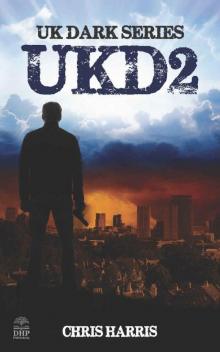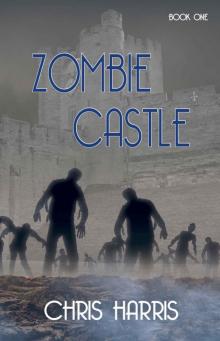- Home
- Chris Harris
Dark Days: A Collection of Short Stories and Poetry Page 2
Dark Days: A Collection of Short Stories and Poetry Read online
Page 2
Swanspool
Leaves crunch under my foot as I try to walk on the path. Instead the trees have shed their skin, leaving a menagerie of colours behind. On the grass, it would be beautiful; reds, yellows, browns and oranges mixing with the lush green. But on the path it was bothersome, and wading through them slowed me down. Not that I was in a hurry, of course; I came here for the scenery. It may not be much, but it's probably the best Wellingborough has. Trees loom above and, even while stripped naked by the wind, seemed to have an imposing presence; maybe it was enhanced by their lack of leaves, as they looked like dead trees, skeleton trees, undead trees.
In the centre of these Edwardian gardens, is what was once a fountain. Now, the statue atop remains, but the water has been replaced with soil; red roses and pink tulips grow out it. The statue seems confused, as if wondering what happened to the water; more likely, it would be wondering why it has neither eyes nor ears. When noticed, the lack of eyes makes it seem unearthly, occasionally unsettling; she could not move without sight nor hearing, as even the sense of smell would be useless for her, with the nostrils plugged with her own silver skin. Out of the corner of my eye, I see a tiger, preserved in wood. A sculpture, chainsaw carved; commemorative of the old Wellingborough Zoo. Even though it closed over thirty years ago, grandparents across the town still blabber on about how great it was, using the long-overused “back in my day...” chestnut. It was a testament to Wellingborough that the Zoo was the only thing that happened in all those years worth remembering.
Near the back of the Garden, there are two tennis courts. Apparently they are “all-weather” courts, but I think both snow and storm would like to disagree; when I think of an all-weather tennis court, I tend to picture them inside or with some sort of shelter over them. No, by all-weather what the designer really means that there is no grass, but that black spongy stuff which is always cracked, with weeds curling their way through its supposedly “impenetrable” surface; a perfect metaphor for society. Usually I wouldn't complain, these spring up everywhere throughout the town, but the courts have no place here; this is a place to celebrate the town's Edwardian background and the essence of the nature that this garden brought with it. While the rusting park benches intrude upon this, they are nothing compared to the eyesores that are the courts.
Ignoring the courts for now, my gaze moves downwards until I can inspect the pathway itself. It is a neutral beige colour, and looks as though it has been formed via an accumulation of discoloured gravel. Grass lines the edges of the path, putting me in mind of a red carpet surrounded by a tiny audience. I bend down to examine the path further. A spider flees from me as my face suddenly draws closer, its legs scuttling along the ground. Briefly, I wonder why it had not already ran; my footsteps must sound like thunderclaps to it, bringing forth at least a small tremor with every one. Evidently the spider was used to steps, yet obviously not so accustomed to idiots trying to shove their face at it. I stand up again and continue walking, taking care to walk around where the spider was; I'm not a murderer.
The tree nearest to me has a bronze plaque in front of it. I can't read the inscription fully, only make out a few letters. From a distance, it had seemed to be in pristine condition but on closer inspection it was a mess, covered in scratches, dents and some letters were warped due to weathering; it symbolises the town. The tree that the plaque described was of monolithic proportions; the king in the Garden. It cast its shadow over me, plummeting this bright day down into darkness. I remember a day without the darkness; her laughter, brown hair blowing in my face; it was a windy day. A face close to mine, her brown eyes piercing my own....
A blink and the memory disappears.
Them
The strong winds try to steal my hat, even as I hold onto it. With it, the wind brings grey clouds, which are emptying themselves above me. I turn my collar up against the wind; I abhor the thought of anything going down my back. Cars go by, their tyres flinging muddy water over another man in front of me. He shouts at the car, before checking on the condition of his brown briefcase. Obviously, it's fine because he continues walking down the street at a brisk pace. It may be a nuisance, but rain is good in this day and age; while there is no vegetation for it to water, the tiny pores in the pavement allowed the water to travel into the underground drainage system. This sent the water to the giant cylindrical Converters; machines which extract the oxygen from water, expelling it into the air.
I finally reach my door, which is made of thick, reinforced steel and has rivets lining its sides. Once, it was silver but now it is a dull grey and has a long scratch going down the middle; obviously deliberate. I place my thumb to the small square in the centre of the door and I feel how spongy it is. A gel emits from the pad, which covers the top digit of my thumb. It feels cold, but after thirty-two years, I'm used to it. The gel, I found out recently from a colleague of mine, Dr Walters, does two things; it reads your fingerprint and the contours around it, whilst checking your pulse, effectively stopping the whole “slicing off thumbs to get into people's homes” malarkey, which was all the rage in the 70's when these doors were introduced to keep Them out.
The gel recedes back into the square and the door swings open. I hurry inside and close the door, which locks with a loud “clunk”. The hallway, at first dark, lights up as I enter it. My hat, I hang on the tree-like hat-stand. Or at least, it seems tree-like based on what I read in an archaic paper-book. We don't have trees now; nowhere near civilisation does. They made sure of that. The walls in my hallway are white, which helps the dull light seem brighter. On the wall to the left of me hangs a small portrait of me and Marty on our balcony. The sun is bright in the picture, and there is a lens flare which mostly obscures me from the image.
The narrow stairs groan as I walk carefully up them; they are bare wood, and I have received many splinters from them. When I reach the top of the staircase, I am greeted by another hallway. The walls are naked; no paint, no pictures, just crumbling white plaster. I don't like to dwell in this corridor, as the plaster ruins my clothes. I can barely afford to buy new ones, or at least, not nice clothes. Most are recycled now, as there is no way to get cotton or silk anymore. I turn right and enter the living room. In front of me, I am greeted with a long glass window, with a door to the balcony in the centre. Leaning over the balcony is Marty; I can tell it's him even though he's facing away; his fire-red hair on the back of his head is rather distinctive. Not wanting to go onto the balcony, I simply tap on the glass and, when he turns, I wave to him just to tell him that I'm home. I dislike going out to the balcony; if They strike, you may not have time to get inside.
The Siren.
Marty suddenly jolts as the ear-splitting screech makes the windows vibrate; They are back.
One of the high-rise buildings across the street starts to crumble as an explosion sounds. Marty stands in a daze, captivated by the destruction. Shard of glass and metal fall from the top, sliding down its sides, before the flames spread out, licking at the sky. The building begins to drop downwards. I can hear screams and the sound of slamming doors, feet pounding and Marty's cry of horror as he sees one of Them.
He rushes to the window as It draws closer, but I am there first, pushing my hand to the shutter's button; one push, and the window is covered in reinforced steel akin to that of the door. It draws closer, inches from the balcony and I push the button. I see Marty bang on the window as the shutter pulls across.
The next thing I hear is the balcony being torn from the building and Marty's scream, embedding itself in my memory as a reminder of my ultimate display of cowardice.
The Bus
A Forest of Stars. Ancient races colliding, engulfing entire worlds. I look up from my book as the bus stops abruptly. Looking out of the window, I see that we are further on in the journey than I had thought. I flick through my book, seeing how far it is until the next chapter. A judgement is made; I have time.
I delve back into the novel, the sci-fi war encapsulating me once more.
As the tale continues, I soon realise that the bus has not moved from the stop yet. I listen to the jingle of coins and far-away words being exchanged on the lower deck. Soon, a woman emerges from the staircase and stumbles towards the back of the bus. She wears a black, possibly leather, jacket over what appears to be a white nightie. If it was not a nightie, it had to some sort of hospital gown, judging by the patterning and colours. As if this was not surprising enough, she had an unlit cigarette held absent-mindedly in her mouth. As she reaches the back of the bus, she takes the cigarette out of her mouth, and puts it somewhere out of sight. I exchange a bemused glance with the elderly man before we hear the woman's voice.
“Just shut up. Shut your fucking mouth.”
We look back around as she repeats these words over and over, staring at the empty seat in front of her. Perhaps the seat's pattern is too garish for her liking, or perhaps she's talking to some faint apparition that no-one could see. I turn back to my book as the bus stops again. The woman runs down the aisle and down the steps, still muttering those words like a mantra as she departs.
Unrequited
She sleeps in the long grass, the doe I hunt. The lime-green blades enveloping her sleek body glowed in the bright sunlight that pierced the darkening clouds of this warm evening. Beneath the blades, a coat of light-brown fur clung to her body, not a strand out of place. Slowly, she awakens and her body rolls in the grass. Her eyes, black and deep, opened and caught me inside of them. The clouds began to part and she rose to her full height and beauty against the setting sun, a swirl of oranges and purples surrounding her. She looked at me once more, before prancing off towards the trees.
I followed the doe, matching her step-for-step, as brown and orange leaves floated down from the treetops. Once, I found the orange leaves to be stunning, but today they paled compared to my target; I could not tear my eyes away. She looked back, but I do not believe she saw my meagre self from within the tightening network of trees.
The trees became closer and closer together as the sky clouded over once more; not jolly, white clouds this time, but furious dark clouds, looming dangerously overhead. The forest suddenly and unexpectedly opened out into a small clearing. The ground was littered with large twigs and leaves, and the doe stood majestically among them, almost floating above the debris; walking on the air. A twig snapped as another shape entered the clearing from the chasm of darkness beyond. As my eyes finally adjusted to the lack of light, I realised that the other shape was a stag, much larger than I; his antlers tall and royal, where mine were twisted and worn. The doe pranced over to him, further away from me. As she stood aside the stag, it looked upon me, before they turned and strode into the darkness.
An echo of thunder and the start of rain told me that the hunt was over.
The Norse March
THOOM THOOM
LEFT RIGHT
Feet pummelled the ground to the sound of drums. Packed together like cows on the cattle-wagon, we marched forth into battle. The ground was sprinkled with snow, and the soil beneath was rock-hard due to the build-up of ice. The snow coated our iron boots, matting with the furs accompanying them, and this made our march even more arduous.
THOOM THOOM
LEFT RIGHT
And the beat went on, the drummer being stationed in the centre of the march; a marching beat to us, but a warning to the enemy. They knew we'd be coming. As I looked around me, I felt fear at the mountains, which dwarfed us all as they gazed down omnisciently like the Gods themselves. Maybe they were Gods. Maybe the snow was one of their trials. Or could they be our enemies' gods? Dark Gods cast in stone, ice and shadows?
THOOM THOOM
LEFT RIGHT
My Hill
Grass, as green as the ocean is blue, danced in the winter's breeze. Not all of the ground I sat upon was graced by the grass's presence; patches of dull brown soil broke the grass up into small islands. From the hill, I watched people walking past. First, a lone man talking loudly on his mobile phone.
“...yeah, meet me there...”
Then came a family of five; a young mother pushing a pram, fussing over the baby inside, whilst the smooth-headed father watched the two young boys, who both wore matching red t-shirts and were running ahead of their parents.
“Kids, wait by the curb!”
They looked so tiny from the hill; I could blot them out with my palm, or clench my hand into a fist to crush them from up high. Their existence seemed meaningless, just like the insects that crawled in the grass beside me.
On the side of the hill I favoured, people were rarely seen. Rows of trees stretched on for what seemed like miles; perhaps it was. With these trees came great expanses of open fields, which stretched onwards into the horizon, meeting the light-grey sky at the edge of the world. On the horizon, three cylindrical towers stood tall and proud; wind turbines. The blades whirled slowly, as if giant cogs in a machine of the Gods. However tall they were, it was insignificant to me; from my hill, they were nothing. They could be blotted out with naught but a wave. I could not crush these; I clenched my hand, and the blades jutted out of the side of it.
A bird flew overhead and yelled at the ground beneath it. It swooped low, as if to attack the foe that had angered it, but instead landed heavily, disturbing the grass beneath it. It yelled again, as if challenging an unseen enemy, before it hopped forwards, stopped again, and began to tear up the ground. Birds were difficult to blot out when airborne; they moved too fast. But grounded, it was easy.
Laughter shattered the tranquillity of near silence; a gaggle of youths were walking past, the leader riding a bike. They stood for a moment, spouting colloquialisms and profanity. When they eventually moved on, the silence returned; only the bird's screaming remained. But that was nature, it doesn't count against the silence; only man could do that.
The wind had picked up now, and the birds cries were soon lost within it. The winds carried a smell with them; it was not unpleasant, and obviously came from one of the restaurants nearby. I could almost see the restaurants from the hill, but a wall of trees impaired my view. A leaf fell from one of the trees and drifted to the ground. But it was intercepted by the wind, which threw it to the left, where it landed on a sheet of green.
The sky was darker now than it was before.
Inferiority Complex
I
A bolt of lightning lit up the dark rooms with an ear-splitting crack. Fork lightning was rare these days, but when it came, it certainly came with a bang. Just as it did tonight, as one of the stone gargoyles fell from its perch on the side of the titanic building. Although, describing it as titanic does not really give the original Titanic a fair representation. It was the sort of place you would expect filming for a new Dracula Movie remake: a gargantuan building, totally out of place amongst the district of smaller, seemingly insignificant rows of houses that surrounded it.
The cleaner, his name was Jack, cursed as he stepped on one of the fragments of gargoyle. He looked down at it, his weak eyes barely seeing it in the darkness and hazy effect that the fast falling rain had on the landscape. The rain drops fell in quick succession, falling onto the uneven pavement before ricochetting off into oblivion. Jack, who had by now finished his shift, kicked the fragments to one side and walked away, whistling happily.
As he rounded a bend, he noticed a moving shadow from inside the main entranceway. He tutted furiously. All the patients should be locked away in their rooms at this hour. He checked his watch quickly with an abrupt flick of his wrist. Yes, they should all be in their rooms.
He pushed open the heavy wooden door and suspected that the builders had only added this to fit the horrific décor, none of which was clearly visible aside from one spotlight which threw a stomach-curdling sight into view.
Jack's eyes widened as he surveyed the scene: a headless corpse swung from a rope, tied by its ankles. Blood stained the walls and three words could be made out, written in spiky capitals:
"NOT MY SUPERIOR"
&nb
sp; Jack surveyed the uniform hurriedly: a faint blue/grey jacket covered a white shirt. The man was of an average build and a name tag on his shirt revealed him to be Ross Wilson, the manager, if such a position could be called so, of this place.
Jack stepped back, heart pounding as he took his mobile phone out of his pocket, hands fumbling with the blasted thing. He unlocked it, before dialling 999. He held the phone to his ear shakily, before the phone beeped loudly: no signal. He cursed loudly, echoing through the corridor.
His phone fell from his hand and broke on the floor. He looked around before bending down to pick the pieces up. Footsteps sounded behind him but, before he could turn around, everything descended into darkness....
II
Sex is rife in retirement homes, some say. These people who always seem anonymous also try to claim that sex is rife inside the Hemmingwell Asylum For The Mentally different. They are one hundred percent wrong. With over sixty of the one hundred patients in straitjackets for most of their time inside the facility and the other thirty-odd being either people with depression or some other sort of mental illness, such as Delusional Paranoia or Agoraphobia, the chances of any other patient, although inmate is another word used, actually trusting another person to even speak with them properly was highly unlikely.
In all of its one year reign as the most "efficient" asylum in England, it has had over five hundred patients and cured many of them within a couple of months. Of course, that involved a lot of psychiatrists working in shifts around the clock. Generally called "Quacks" by the patients, these were some of the best in the country and ranked somewhere in the world's top one hundred psychiatrists, most likely compiled by someone who has far too much time on their hands.
Of course, this gruelling routine has its downsides. Psychiatrists here worked on eight hour shifts; morning, afternoon and night. The staff on the night shift were generally the worst and could probably pass for being a patient themselves, being deranged enough to come in between the hours of 10PM until 6AM and were the only shift to actually diagnose and treat patients in their own cell room.
However, there was some controversy around England's most famous Asylum: the fact that they have treated and housed five hundred and seventy five patients, yet only just under four hundred have ever been accounted for. All evidence, what there was of it, showed no wrong doings by the staff and all the patient attacks and murders had been accounted for. New security officers were soon put into place and they roamed the derelict hallways every night, watched by eyes that seemed to be there but were, in actual fact, just mere reflections of their torches off of various minerals embedded into the stone walls: bricks were too easy for some of the stronger patients to remove. They had never had a patient escape, even with the old security and there was very few incidents of violence inside the actual asylum walls.
The erecting of the asylum a year earlier also helped solve a problem in its surrounding area, the Hemmingwell estate. Notorious in it's reputation for crime and gang violence, the County Council had planned to build a prison. A prison that would stare deep into criminal's blackened hearts and drive fear through them all. It looked down on them all and, although not alive, the seamless nature of the exterior construct made it seem like it was grown, not made. And then there were the demonic gargoyles.
Knowing that this prison was a threat, many gangs fled the area, relocating to other towns whilst swinging a false bravado about them to hide their darkest fears which were realised by the building. And thus, the County Council had built a huge building, with no real use. the older prison was fine for now, but the previous asylum was falling to pieces...
And thus, The Hemmingwell Asylum For The Mentally Different was born into reality, and it worked like clockwork, aside from the missing patients.
And the forgotten patient in block D...

 Dark Days: A Collection of Short Stories and Poetry
Dark Days: A Collection of Short Stories and Poetry_preview.jpg) Emergence (Unedited Edition)
Emergence (Unedited Edition) Uprising
Uprising UKD2: UK Dark Series Book 2
UKD2: UK Dark Series Book 2 UKD3: UK Dark Series Book 3
UKD3: UK Dark Series Book 3 Zombie Castle (Book 1)
Zombie Castle (Book 1)